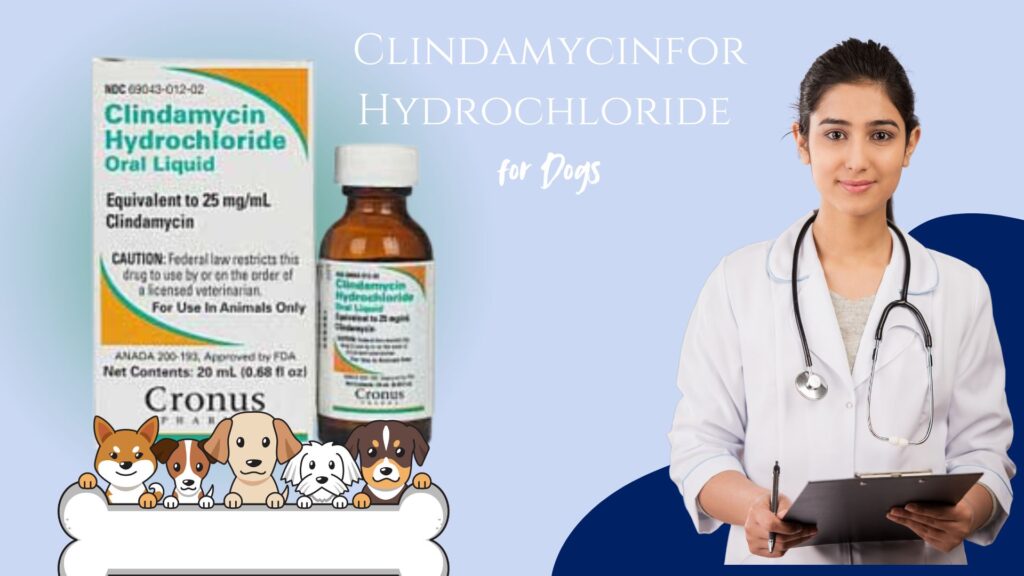INTRODCUTION:
When veterinarians are dealing with combating bacterial infections in dogs, they typically reach for powerful antibiotics to bring about swift relief. Clindamycin Hydrochloride for Dogs is one of the most popular antibiotics used. The antibiotic is very powerful against a variety of infections, such as skin infections and potentially deadly bone infections. As a pet owner looking for a potent antibiotic for your dog, this article will guide you through the uses, advantages, dosage, side effects, and drug interactions.
What is Clindamycin Hydrochloride?
Clindamycin Hydrochloride is a generic name for an antibiotic that belongs to the lincosamide class. It is primarily used to combat bacterial infections by inhibiting bacterial protein synthesis, making it an effective option for treating various conditions in dogs.

Mechanism of Action:
Clindamycin Hydrochloride for Dogs binds to the bacterial 50S ribosomal subunit, inhibiting protein synthesis in bacteria. It inhibits the multiplication of bacteria, which ultimately causes the death of the bacteria. It is a bacteriostatic antibiotic and does not kill bacteria but inhibits the growth of bacteria, allowing the immune system time to eliminate the infection.
Route of Administration:
It can be given by several routes, such as:
- Oral (capsules, tablets, or liquid suspension)
- Injectable form (for serious infections under veterinary care)
- Topical application (in some instances of skin infections)
Dosage of Clindamycin Hydrochloride for Canines:
The dosage of Clindamycin Hydrochloride varies according to the kind of infection and its severity. The usual dosages prescribed are:
- For skin infections: 5.5 mg/lb (11 mg/kg) every 12 hours
- For dental infections: 5.5 mg/pound (11 mg/kg) every 12 hours
- For osteomyelitis (bone infections): 11 mg per pound (22 mg/kg) every 12 hours for at least 28 days
Always consult with your veterinarian prior to giving Clindamycin Hydrochloride in order to determine proper dosage and length of treatment.

5 Powerful Benefits of Clindamycin Hydrochloride for Dogs:
1. Effective Against Bacterial Infections:
Clindamycin Hydrochloride for Dogs is highly effective against a wide range of bacterial infections, including:
- Skin infections (pyoderma)
- Wound infections
- Respiratory tract infections
- Bone infections (osteomyelitis)
- Periodontal infections (dental infections)
2. Treats Deep Tissue Infections:
In contrast to other antibiotics that can only target surface infections, Clindamycin Hydrochloride for Dogs is able to reach deep within bones and tissues and is thus perfect for the treatment of deep abscesses and severe infections like osteomyelitis.
3. Works Against Anaerobic Bacteria:
Clindamycin Hydrochloride for Dogs is particularly effective against anaerobic bacteria, which thrive in low-oxygen environments. This makes it a preferred choice for treating internal infections such as abscesses and periodontal diseases.
4. Utilized for Post-Surgical Infections:
After surgical procedures, dogs are at risk of developing infections. Clindamycin Hydrochloride for Dogs is often prescribed post-surgery to prevent bacterial infections and ensure a smooth recovery.
5. Safe for Long-Term Use Under Veterinary Supervision:
For chronic infections like osteomyelitis, Clindamycin Hydrochloride for Dogs can be safely used for extended periods under veterinary guidance. This ensures the infection is completely eradicated, reducing the chances of recurrence.
Indications for Clindamycin Hydrochloride for Dogs:
Veterinarians commonly prescribe Clindamycin Hydrochloride for Dogs to treat conditions such as:
- Bacterial skin infections
- Dental abscesses and periodontal disease
- Wound infections
- Respiratory infections (bronchitis, pneumonia)
- Bone infections (osteomyelitis)
- Soft tissue infections
Contraindications: When Not to Use Clindamycin Hydrochloride for Dogs:
Although Clindamycin Hydrochloride for Dogs is a strong antibiotic, it is not appropriate for all dogs. The following conditions can contraindicate its administration:
- Allergic reactions to Clindamycin or lincosamide antibiotics
- Liver or kidney disease (requires dose adjustments or alternative treatments)
- Pregnant or nursing dogs (only use if prescribed by a veterinarian)
- Dogs with gastrointestinal disorders, such as colitis or severe diarrhea
Potential Adverse Effects of Clindamycin Hydrochloride for Dogs:
Although Clindamycin Hydrochloride for Dogs is generally safe, some dogs may experience side effects, including:
- Gastrointestinal symptoms (vomiting, diarrhea, loss of appetite)
- Allergic reactions (swelling, itching, trouble breathing)
- Lethargy and weakness
- Esophageal irritation (ensure dogs drink water after oral administration)
In case your dog develops serious side effects, stop use and consult a veterinarian right away.
Drug Interactions: What Not to Mix with Clindamycin Hydrochloride for Dogs:
Certain medications can interact negatively with Clindamycin Hydrochloride for Dogs, leading to reduced efficacy or increased side effects. Be cautious if your dog is taking:
- Erythromycin (may decrease Clindamycin’s effectiveness)
- Chloramphenicol (may cause competitive inhibition)
- Neuromuscular blockers (increased muscle relaxation effect)
- Cyclosporine (may reduce the effectiveness of cyclosporine)
Always let your veterinarian know what medications your dog is already taking to prevent drug interactions.
Conclusion:
Clindamycin Hydrochloride for Dogs is a strong and effective antibiotic that cures a range of bacterial infections. If your dog has a skin infection, dental abscess, or even a serious bone infection, this drug can offer relief. But it is important to administer Clindamycin Hydrochloride for Dogs under the guidance of a veterinarian to get the correct dosage and avoid side effects.
By being aware of the benefits, indications, contraindications, and potential drug interactions of Clindamycin Hydrochloride for Dogs, you can make an informed decision about your pet’s health. If you suspect your dog is infected, consult your veterinarian to see if Clindamycin Hydrochloride for Dogs is the best course of treatment for your dog.
Remember: Always complete the full course of antibiotics as prescribed by your vet to prevent bacterial resistance and ensure a full recovery for your pet. Has your dog ever been prescribed Clindamycin Hydrochloride? Share your experiences in the comments below!


